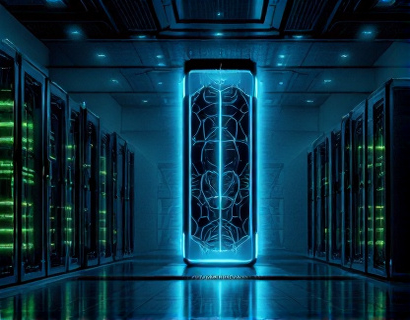Maximizing Productivity and Security with Decentralized Blockchain Calendar Solutions for Modern Teams
In the fast-paced world of modern business, efficient scheduling and seamless collaboration are paramount for success. Traditional calendar management systems often fall short in providing the necessary security, flexibility, and productivity boost that today's tech-savvy professionals and organizations require. Enter decentralized blockchain calendar solutions, a revolutionary approach to event management that promises to transform the way teams schedule and collaborate. This article delves into the benefits and functionalities of these cutting-edge platforms, highlighting how they can streamline scheduling, enhance productivity, and ensure robust security.
Understanding Decentralized Blockchain Calendar Solutions
Decentralized blockchain calendar solutions leverage the power of blockchain technology to create a distributed and immutable ledger for calendar data. Unlike traditional centralized systems, where data is stored on a single server, blockchain calendars distribute data across a network of nodes, making them inherently more secure and resilient to failures. This decentralized nature ensures that no single point of failure can disrupt the entire system, providing unparalleled reliability and uptime for teams.
The use of blockchain in calendar management introduces several key advantages. First, the immutability of blockchain ensures that once an event is scheduled, it cannot be altered or deleted without consensus from the network. This feature is particularly valuable for organizations that require a tamper-proof record of meetings and appointments. Second, the transparency of blockchain allows all participants to have real-time access to the same calendar data, reducing the risk of miscommunication and double bookings. Finally, the cryptographic security of blockchain ensures that sensitive information is protected from unauthorized access and cyber threats.
Enhanced Security Features
Security is a top priority for any calendar solution, especially for organizations handling sensitive information. Decentralized blockchain calendars offer robust security features that traditional systems cannot match. Each calendar entry is encrypted and linked to the previous entry through a cryptographic hash, creating a secure chain of data. This means that even if one part of the data is compromised, the entire chain remains intact and secure.
Access control is another critical aspect of security in blockchain calendars. Users can set specific permissions for each event, determining who can view, edit, or invite others to the calendar. These permissions can be granular, allowing for fine-tuned control over who has access to what information. Additionally, blockchain calendars often incorporate multi-signature requirements for critical actions, such as changing event details or deleting events, adding an extra layer of security.
Improved Collaboration and Time Management
One of the most significant benefits of decentralized blockchain calendars is the enhancement of collaboration and time management. With a centralized calendar, scheduling conflicts and double bookings are common issues that can disrupt workflows and waste valuable time. Blockchain calendars eliminate these problems by providing a single, real-time source of truth for all participants.
Teams can easily schedule meetings and appointments without the hassle of back-and-forth emails or multiple calendar apps. The decentralized nature of the platform ensures that all team members have access to the most up-to-date calendar information, reducing the likelihood of scheduling conflicts. Moreover, automated notifications and reminders can be set up to ensure that everyone is aware of upcoming events, further streamlining the scheduling process.
Time management is also significantly improved with blockchain calendars. Users can set recurring events with precise intervals and durations, and the system will automatically generate the necessary entries without manual intervention. This feature is particularly useful for regular meetings, such as weekly team updates or monthly strategy sessions. The platform can also integrate with other productivity tools, allowing for seamless task management and time tracking.
Scalability and Flexibility
Decentralized blockchain calendars are designed to scale with the growth of organizations. As teams expand or contracts vary, the blockchain calendar can accommodate these changes without compromising performance. The distributed nature of the system means that it can handle a large number of users and events without the risk of server overload or slowdowns.
Flexibility is another key advantage. Blockchain calendars can be customized to fit the specific needs of different organizations. For instance, businesses in regulated industries can implement compliance-specific features, such as audit trails and regulatory reporting. The platform can also support multiple time zones and currencies, making it ideal for global teams and international collaborations.
User Experience and Accessibility
Despite their advanced technology, blockchain calendars are designed to be user-friendly and accessible. The interface is intuitive, allowing users to easily navigate and manage their calendars. The platform can be accessed via web and mobile applications, ensuring that team members can stay connected and productive from anywhere.
Integration with existing tools and services is another focus area. Blockchain calendars can seamlessly integrate with popular productivity suites, such as email clients, project management tools, and communication platforms. This integration enhances the overall user experience by providing a cohesive and efficient workflow.
Case Studies and Real-World Applications
Several organizations have already adopted decentralized blockchain calendar solutions, achieving significant improvements in productivity and security. For example, a global consulting firm implemented a blockchain calendar to manage client meetings and project timelines. The firm reported a 30% reduction in scheduling conflicts and a 25% increase in meeting productivity. The transparent and immutable nature of the calendar ensured that all stakeholders had access to accurate and up-to-date information.
A tech startup used a blockchain calendar to streamline internal communications and collaboration. The platform's real-time updates and automated notifications helped the team stay aligned and focused on their goals. The startup noted a 40% improvement in project delivery times, attributed to the enhanced coordination and time management provided by the blockchain calendar.
Future Trends and Developments
The adoption of blockchain technology in calendar management is still in its early stages, but the potential for growth is immense. As more organizations recognize the benefits of decentralized systems, we can expect to see increased innovation and adoption. Future developments may include advanced AI integrations for predictive scheduling, enhanced privacy features, and more sophisticated integration capabilities with IoT devices and smart contracts.
The rise of decentralized finance (DeFi) and the increasing popularity of non-fungible tokens (NFTs) may also influence the evolution of blockchain calendars. For instance, NFTs could be used to represent unique event tickets or access rights, adding a new dimension to event management. The combination of blockchain calendars with these emerging technologies could further revolutionize how we manage time and collaborate.
Conclusion
Decentralized blockchain calendar solutions offer a transformative approach to scheduling and collaboration for modern teams. By providing enhanced security, improved time management, and seamless integration with other tools, these platforms address the critical needs of today's tech-savvy professionals and organizations. As the technology continues to evolve, the potential for even greater efficiency and innovation is vast. Embracing blockchain calendars is not just a step forward; it's a leap into a future where productivity and security go hand in hand.











































